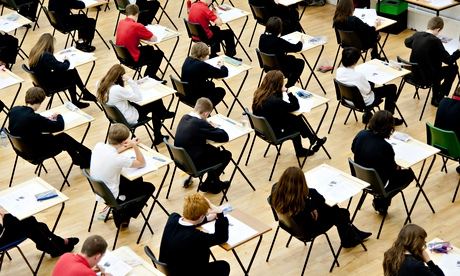Major study found that incentives made some pupils work harder in class but had no impact on exam performance

Offering rewards such as cash payments or free trips make pupils work harder in class but fail to improve their exam results, according to an intensive £1.6m study involving 10,000 children.
The project involved pupils studying for GCSE exams at 63 schools in deprived areas across England, and was aided by a team of academics that included superstar professors such as Steven Levitt, the co-author of Freakonomics, and John List of the University of Chicago.
Professor Simon Burgess of Bristol University, who helped design the study, which was funded by the Education Endowment Foundation, said: “I was very disappointed with these results. I thought the incentives would have had an impact on grades.”
Pupils were randomly offered incentives, including cash payments of up to £160 a term if they met targets for homework, attendance, behaviour and classwork in English, maths and science. Others were offered free outings or trips if they reached the same targets, and a control group was offered no incentives.
An independent analysis by the Institute for Fiscal Studies (IFS) found no statistically significant improvement in most areas, other than classwork. Homework, behaviour and attendance showed no improvement for cash, and neither did GCSE grades. The offers also failed to inspire those pupils eligible for free school meals.
The only bright spot was that the offer of a trip did improve the maths results of pupils with the worst academic record, who showed small but significant amounts of extra progress.
Kevan Collins, chief executive of the Education Endowment Foundation, said the research was useful in refining what does and does not work. “The best evidence currently available suggests that the most powerful driver of achievement in schools is great teaching, particularly for students from low-income families,” Collins said.
Burgess said the problem may be that pupils were unable to see the connection between studying hard and getting better academic results that lead to a well-paid job and a better life. “If pupils can’t see one of those links, then they are going to struggle,” he said.
He said parents who offer their children rewards such as laptops or phones for passing exams should rethink their strategy.
“What you want to reward is effort, You don’t want to reward a child for having your genes,” he said. “If you want to motivate them, you need to motivate them to try harder.”
The IFS assessment concluded that future research should “explore the level of incentive required to induce pupil effort”, and why incentives appeared to improve classwork effort but failed to translate into better grades.
The design of the rewards used previous research on “loss aversion”, which found that people respond more strongly to losses than gains, and prefer immediate rather than delayed rewards. Pupils started off with a notional £80 a half-term, with deductions made for poor attendance and other benchmarks. The average payment per pupil was £225 out of a maximum £320 during the period of the study in 2012 and 2013.
0 Response to "Student rewards such as cash and free trips fail to improve GCSE results"
Post a Comment